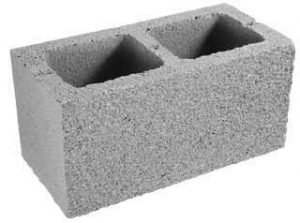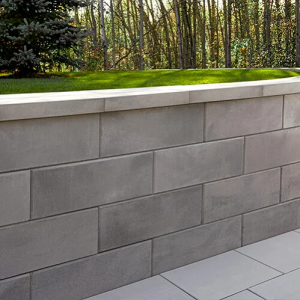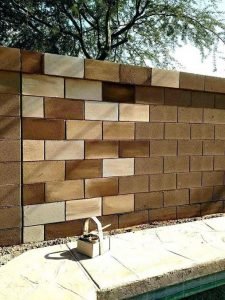Concrete blocks, also called cinder blocks, are some of the most commonly used building materials in construction.
 This product is generally used in the construction of foundations, security barriers, bearing walls, landscaping design, retaining walls, screening walls, fences, and so much more.
This product is generally used in the construction of foundations, security barriers, bearing walls, landscaping design, retaining walls, screening walls, fences, and so much more.
But, although the words “concrete block” and “cinder block” are used interchangeably, it’s important to clear up the fact that they are not the same thing.
The shapes and sizes of most common concrete blocks have been standardized to 8 in high x 16 in wide x 8 in deep.
Cinder Block Vs. Concrete Block
For starters, both contain a mix of cement and aggregate.
However, concrete blocks use fine-crushed stone alongside steel, wood, or cement to gain its form and offer a hard building material of high strength. Concrete blocks are, therefore, naturally stronger and heavier than cinder, which is made up of coal cinders or ash.
Cinder blocks are generally used for smaller projects such as garden walls and prohibited in many forms of construction around the home.
So be sure to know the difference. If you have a large building project to tackle, concrete blocks will more likely be used, and this is important to know when factoring in costs.
On the other hand, if you require something lighter, cinder may be a good choice for you.
The Cost To Install Concrete Blocks
Concrete blocks have many uses. They are a popular choice for building masonry chimneys, concrete steps, and block walls.
As with most masonry projects, the cost of your concrete blocks installation cannot be correctly given with some of your details, specifications, and unique requirements. However, we can estimate the typical costs.
 For an average of 100 sq. ft., homeowners tend to budget in the region of $1,000 – $1,900 to complete the installation.
For an average of 100 sq. ft., homeowners tend to budget in the region of $1,000 – $1,900 to complete the installation.
If you’re only purchasing materials, you can expect to budget in the region of $650 on the lower end. For some top-end materials, you can pay as much as $1,300.
Looking at a larger project of roughly 2,100 sq. ft., budgeting anywhere in the region of $20,000 becomes realistic.
On average, however, concrete block wall installations can cost anywhere between $10 – $18 per sq ft.
Labor costs
The labor involving the construction of a concrete block wall can be very intensive.
The only way to get an accurate estimate of how much your concrete block installation is going to cost is by comparing estimates from a local professional.
Concrete Block Walls
Concrete block walls have various uses both residentially and commercially. They can be used to create a very attractive look or simply put in place as a retaining wall to prevent water or earth from encroaching into specific parts of the property.
Security Barriers
One of the most common uses of concrete blocks is for the construction of security walls. The practical uses are obvious, but solid concrete blocks offer a tough barricade to keep people and vehicles out of certain areas.
The Benefits of Concrete Blocks
Concrete blocks are solid and offer high durability no matter what mother nature (or vandals) throws at it.
This also means that your wall will last much longer with less maintenance and repairs required.
Moreover, concrete blocks can serve to lower your insurance rates due to their fire-resistant qualities.
Concrete blocks have excellent load-bearing capabilities and can be used in almost any type of construction.
Your project can easily be adjusted and changed mid0-construction without a big hassle or delay to the overall site project.
And with a massive variety of finishes that can be applied, reduced sound transmission, and eco-friendly, it’s easy to see why concrete blocks have remained one of the most popular building materials worldwide.
Request an Estimate from Local Professionals
To get a clearer idea of what you should be paying from some concrete block installation, it’s highly recommended to get in touch with local contractors and compare some free estimates. This will not only help you compare costs to find the best price but also identify the best contractor for your particular installation project.